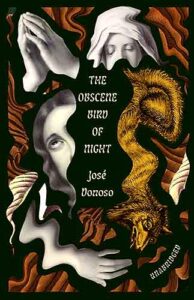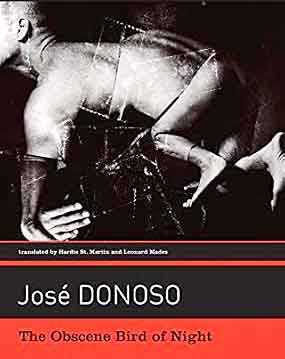By JOSÉ DONOSO (New Directions; 1970/2024)
In the Latin American Boom of the 1960s and 70s, THE OBSCENE BIRD OF NIGHT by Chile’s late José Donoso (1924-1996) tends not to be mentioned amid classics of the form like HOPSCOTCH and ONE HUNDRED YEARS OF SOLITUDE—and no wonder, as Donoso’s book is a bleak and deranged work that eschews the humanistic approach of its fellows. Nonetheless, I feel THE OBSCENE BIRD OF NIGHT stands up to those other novels in every aspect and, in fact, bests them.
According to Donoso, a brilliant but apparently deeply insecure man, this novel was conceived in a morphine-induced trance during which “I had an incredible fit of madness, with hallucinations, paranoia, and above all a terror that was larger than life.” The novel does indeed have the feel of an extended fever dream, with an epic tapestry that functions as a political satire, gothic pastiche and Jodorowskian spectacle (it’s not insignificant that Alejandro Jodorowsky and José Donoso hailed from the same country). The end result is an account that’s challenging, often shocking and, for those willing to make the leap, quite astonishing.
It’s related by Humberto Peñaloza, a.k.a. El Mudito, a shell of a man who functioned as a repository for his creator’s insecurities (which were apparently legion). He resides in the Casa de la Enunciación at La Chimba, a labyrinthian structure built to house a saintly woman that’s become a prison for those relatives Don Jerónimo de Azcoitia, a powerful politician, seeks to cast off. Among those cast-offs are Mudito, who was formerly one of Jerónimo’s trusted servants, and a cadre of batty old women obsessed with reenacting the supposedly miraculous birth of the Casa’s original subject, with Mudito made to assume the guise of a doll and a fetus.
As Mudito thinks back over his life, during which he assumes multiple viewpoints and perspectives (the first, second and third person are all utilized), he discloses some dark secrets. We learn, for instance, that he once took a bullet meant for Jerónimo by assuming his guise. Mudito also claims to have impersonated his master on another occasion, impregnating his wife Inés; this led to the birth of Boy, a horrifically deformed child who Jerónimo sequestered in a mansion known as La Rinconada. It and the surrounding lands were peopled entirely by human oddities to shield Boy from any knowledge of his own freakishness, with Mudito put in charge of selecting La Rinconada’s “monsters” and documenting their progression. But Jerónimo, upon learning of Mudito’s dalliance with Inés, subjected his servent to debilitating surgery that left him barely functional—hence his current predicament.
This is all related in a highly convoluted, puzzle-like manner that divvies out its revelations gradually, and so mirrors the descriptions of the labyrinthine casa where so much of the book takes place. Adding to the confusion is the fact that the narrator is far from reliable, often directly contradicting his own recollections (Mudito can’t seem to make up his mind, for instance, whether he actually had sex with Inés or her servant Peta, or whether the surgery to which he was subjected included castration), with the ultimate revelation, it would seem, being that this whole sordid saga is a product of Mudito’s disordered mind.
The version of this novel under review is the 2024 publication by New Directions, which contains the unexpurgated text. The previous English version by Hardie St. Martin and Leonard Mates was missing around twenty pages from Donoso’s original Spanish language manuscript, with those extra pages, translated by Megan McDowell, contained here. They don’t render Donoso’s narrative convolutions any clearer, but they do at least alleviate my major complaint about the earlier translation: it contained little-to-no information about life in La Rinconada, lavishing the bulk of its text on Mudito and the hags in the Casa. That’s still the case, but this update contains a bit more detail about Boy and the monsters, which I say makes all the difference in the world.


